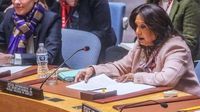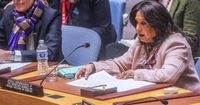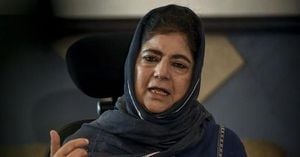Humanitarian aid for victims of sexual violence in conflict zones is vanishing at a perilous rate, leaving countless survivors without the basic help they desperately need, according to a recent warning delivered by a senior United Nations official. Pramila Patten, the U.N. special representative on sexual violence in conflict, addressed the U.N. Security Council this week with a frank assessment: essential services for survivors are now “the least accessible at the very moment they are needed most.”
Patten’s remarks, reported by the Associated Press and ABC - US News, came at a time when clinics and shelters around the globe are closing their doors due to severe funding shortfalls. The situation is especially dire in regions like eastern Congo, where rape survivors are being turned away because clinics simply cannot provide even the most basic care. “We are told there is no money for lifesaving aid, even as military expenditure soars, and the world spends more in 24 hours on arms than it does in a year on addressing gender-based violence in conflict,” Patten told the Security Council, as quoted by AP.
Her criticism was not limited to the U.N. Security Council; she took aim at the broader international community, calling out a collective failure to maintain funding for humanitarian efforts. While Patten did not explicitly name individual countries, her remarks were widely understood to refer to the United States and other major donors who have recently slashed humanitarian assistance budgets. The United States, once the world’s single largest aid donor, has seen its contributions drastically curtailed following decisions made by President Donald Trump’s administration. According to AP and ABC - US News, this retreat from global leadership in aid has had catastrophic consequences for millions who depend on such support for survival.
Patten’s warning comes against the backdrop of a grim new report from U.N. Secretary-General Antonio Guterres. Released last week, the annual report documented a 25% surge in cases of sexual violence in conflict zones in 2024, with more than 4,600 survivors identified over the year. The vast majority of these abuses were perpetrated by armed groups, though some were committed by government forces. The highest numbers of reported cases emerged from the Central African Republic, Congo, Haiti, Somalia, and South Sudan.
But numbers alone do not convey the full horror of the crisis. Patten stressed the “unseen faces behind the figures,” sharing the harrowing story of a young Sudanese woman who was abducted while traveling to collect her college diploma. Dragged off a bus by four members of a paramilitary force, she was gang-raped, left unconscious in a dark alley, and later discovered she was pregnant from the assault. Now, she must not only cope with the trauma of the attack but also care for her newborn child, all while lacking access to the support services she so desperately needs. As Patten recounted, “She became pregnant and is struggling to care for her baby and deal with her trauma.” (AP)
Across the map, the pattern is disturbingly similar. In eastern Congo, clinics that once served as lifelines for women and girls brutalized by conflict are now being forced to turn away survivors. In Sudan, Ukraine, northeastern Ethiopia, and Gaza, health care systems have been “decimated,” Patten said, leaving humanitarian groups scrambling to do more with less. The result: organizations that support women affected by conflict are “going from underfunded to unfunded.” (AP)
Patten’s criticism was pointed, if indirect. She lamented that while the world’s military spending continues to climb, the resources allocated to gender-based violence prevention and survivor support are shrinking to the vanishing point. “I wish I could say that the donor and diplomatic community will uphold its values and hold the line on funding for protection and assistance,” Patten told the Security Council. “But we shall see.” (AP)
The U.N. special representative’s remarks were delivered during a tense Security Council session that also featured acting U.S. ambassador Dorothy Shea. Shea reiterated President Trump’s commitment to eliminating sexual violence in conflicts and expressed support for Patten’s office. However, as noted by both AP and ABC - US News, Shea’s statement conspicuously omitted any reference to renewed funding or concrete financial commitments. This silence has fueled growing concern among humanitarian organizations and advocates that the international community’s promises may ring hollow in the absence of real resources.
According to Patten, the consequences of these funding cuts are both immediate and far-reaching. Clinics and shelters are closing, and survivors are left with nowhere to turn. The organizations that once offered a glimmer of hope are now struggling to keep their doors open, forced to make impossible choices about whom they can help. In her words, “Organizations helping women affected by conflict are going from underfunded to unfunded.” (AP)
The annual report from Secretary-General Guterres underscores just how urgent the situation has become. The 25% increase in documented cases of sexual violence in conflict zones is not merely a statistical blip—it is a sign of deepening crises in some of the world’s most volatile regions. The Central African Republic, Congo, Haiti, Somalia, and South Sudan remain at the epicenter of this epidemic, but the problem is by no means confined to those countries. In Sudan, for example, the collapse of health care infrastructure has left survivors with little hope of receiving even basic medical attention, let alone psychological counseling or legal support.
Patten’s address to the Security Council was both a plea and a rebuke. She called on world leaders to recognize the human cost of their budget decisions and to restore funding for lifesaving aid. “I wish I could say that the donor and diplomatic community will uphold its values and hold the line on funding for protection and assistance,” she said. “But we shall see.” (AP)
Meanwhile, the broader context is one of rising militarism and shrinking humanitarian space. Patten warned that as “militarism is on the march and the clock is being turned back on women’s rights,” the world risks undoing decades of progress in the fight against sexual violence in conflict. Her message was clear: without immediate action to restore and expand humanitarian funding, the most vulnerable will be left to bear the brunt of violence and neglect.
As the international community grapples with competing priorities and limited resources, the fate of thousands of survivors hangs in the balance. The stories behind the statistics—like that of the young woman in Sudan—are a stark reminder that every funding decision has real, often devastating, consequences. Whether the world will heed Patten’s warning remains to be seen, but for now, the outlook for victims of sexual violence in conflict zones is as uncertain as ever.





